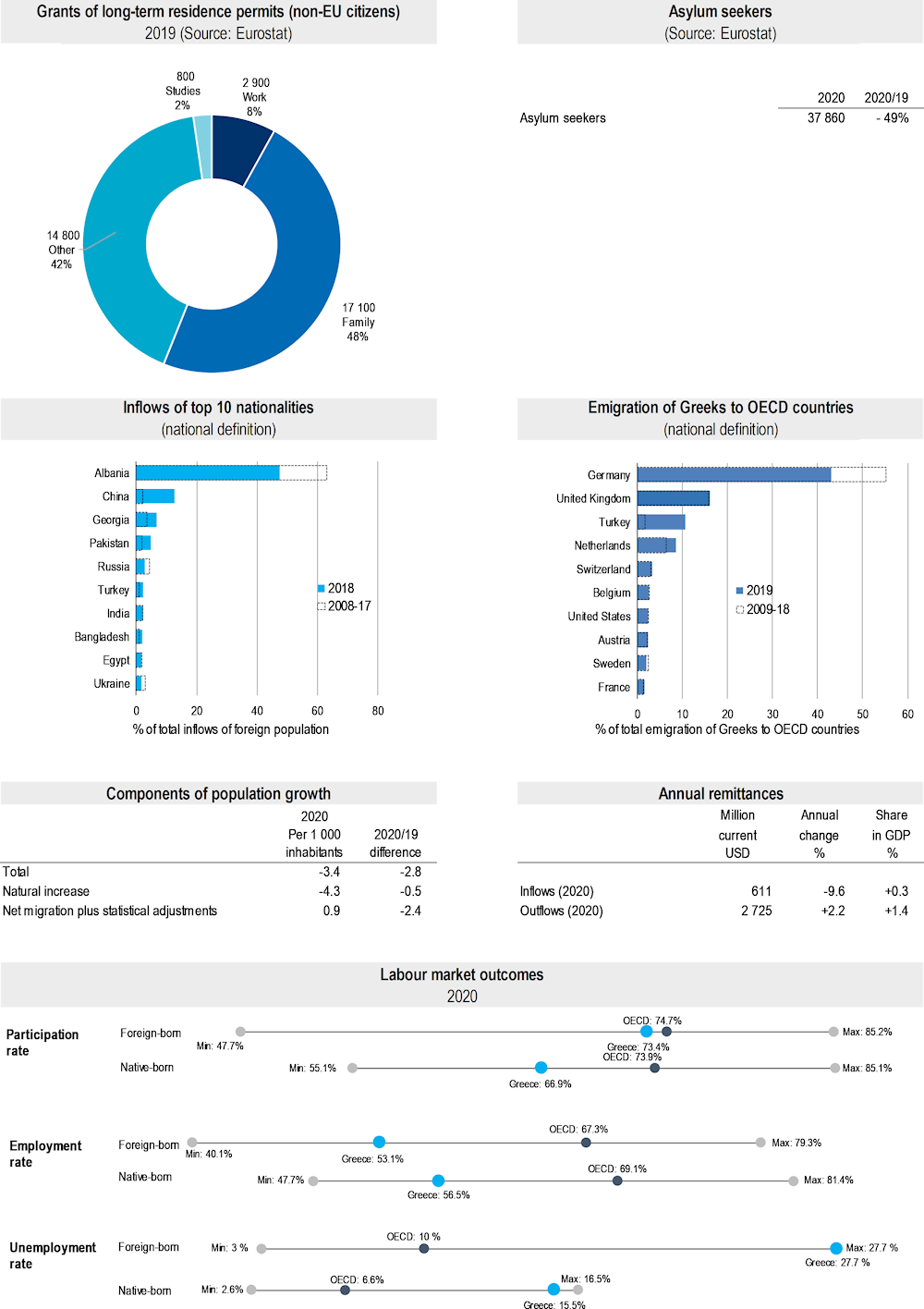In 2019, 42 000 new immigrants obtained a residence permit longer than 12 months in Greece (excluding EU citizens), 19.1% more than in 2018. This figure comprises 7.4% labour migrants, 46.5% family members (including accompanying family), 2.3% who came for education reasons and 43.8% other migrants. In addition, 17 000 intra-EU postings were recorded in 2019, an increase of 55% compared to 2018. These posted workers are generally on short-term contracts.
In 2020, the number of first asylum applicants decreased by ‑49.5%, to reach around 38 000. The majority of applicants came from Afghanistan (11 000), Syria (7 400) and Pakistan (3 500). The largest increase since 2019 concerned nationals of Indonesia (30) and the largest decrease nationals of Afghanistan (‑12 000). Of the 62 000 decisions taken in 2020, 55.2% were positive.
Emigration of Greeks to OECD countries decreased by ‑11% in 2019, to 36 000. Approximately 39% of this group migrated to Germany, 16% to Turkey and 13% to the Netherlands.
Among the most notable developments in 2020 was the amendment of the law on asylum “On International Protection and other provisions” which was introduced in May 2020. The amendments aimed at addressing the concerns that the law raised at the time about its impact on the Greek asylum system, and the safeguards of refugee protection.
In February 2020, the Special Secretariat for the Protection of Unaccompanied Minors was established. Its mission is to plan, implement and supervise the National Strategy in Greece for the protection of unaccompanied minors. The Special Secretariat also initiates and implements all necessary policies and required actions to ensure the protection and well-being of third-country nationals and stateless individuals who are unaccompanied minors or separated from their families. It reports directly to the Minister of Migration and Asylum.
Greece has a “Greek and Foreign NGO Members Registry”, established in 2018, for Greek and foreign NGOs active in the area of asylum, migration and social inclusion. On 27 March 2020, a Joint Ministerial Decision brought changes to the registration and certification rules for this registry. It lays down additional conditions for registration of NGOs and their members, staff and volunteers.
Since May 2020, the dependent residence permit allows spouses of holders of Work/Residence Permit for Senior-Level Employees, to work immediately after the grant. Previously, spouses had to wait for the first renewal of the permit or request a separate authorisation to work. Since 31 December 2020, UK citizens living in Greece must apply for a residence permit, which will last five years, or ten years for those who apply for permanent residence. Greece raised the 2021‑22 EU Blue Card quota for the Attica region to 380, up from 280 previously.
As of 19 April 2021, the measures in place to respond to the COVID‑19 situation were the following.
For all visitors, entry in Greece is subject to the presentation of a vaccination certificate or a negative PCR test conducted up to 72 hours before traveling. Passengers also have to fill in the Passenger Locator Form (PLF). Self-isolation of visitors from abroad is no longer required. Countries from which entry is allowed, under the aforementioned conditions, are EU and Schengen countries, the United States, the United Kingdom, Israel, Serbia, the United Arab Emirates, Australia, New Zealand, Korea, Thailand, Rwanda, Singapore and Russia.
Residence permits are automatically extended until 31 December 2021. For EU Blue Cards holders a salary reduction may impact the outcome of their renewal application. This does not concern other foreign workers who saw their hours reduced or were put in unemployment.
Further information:

